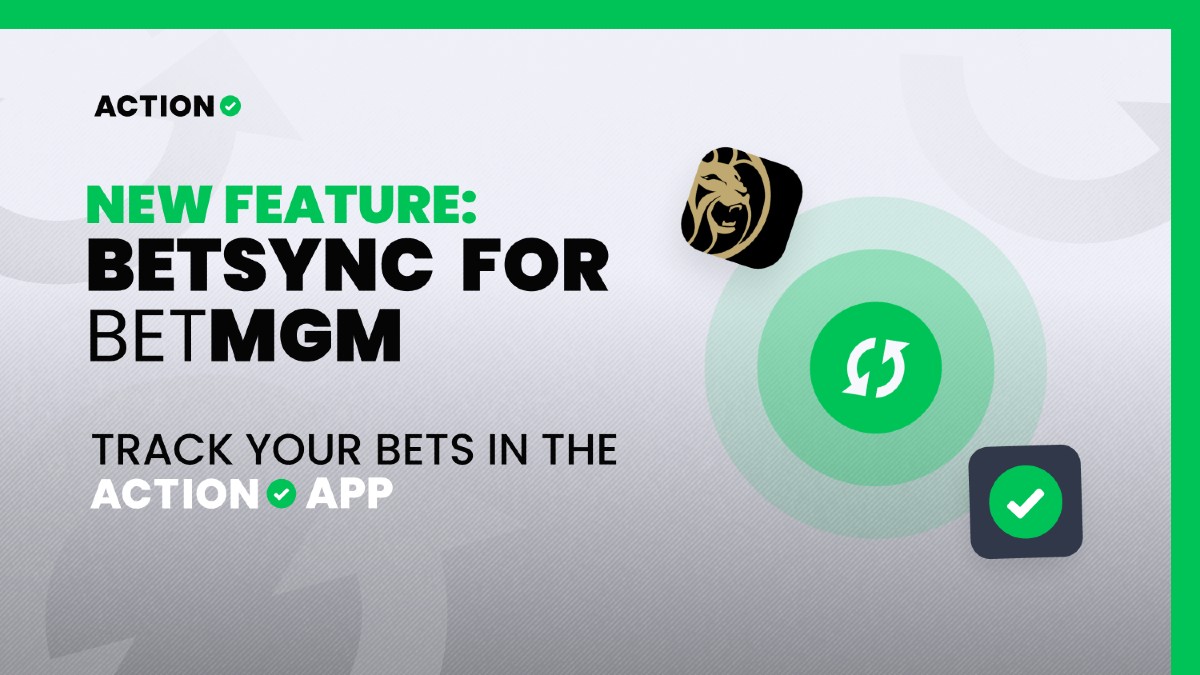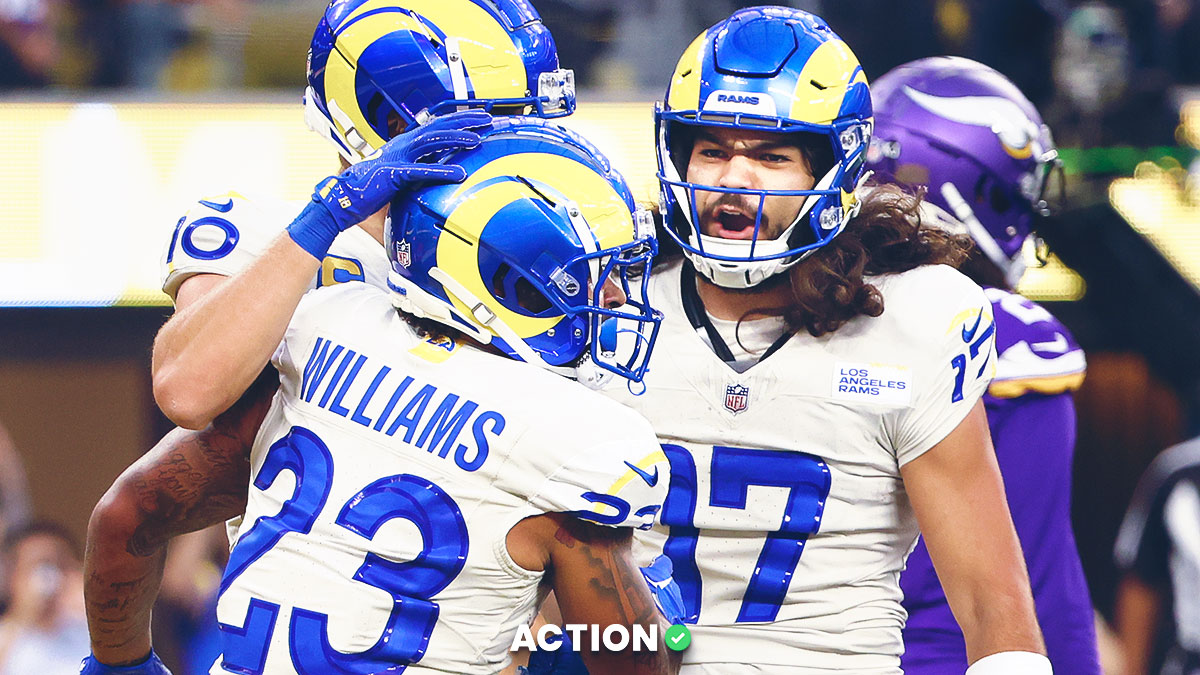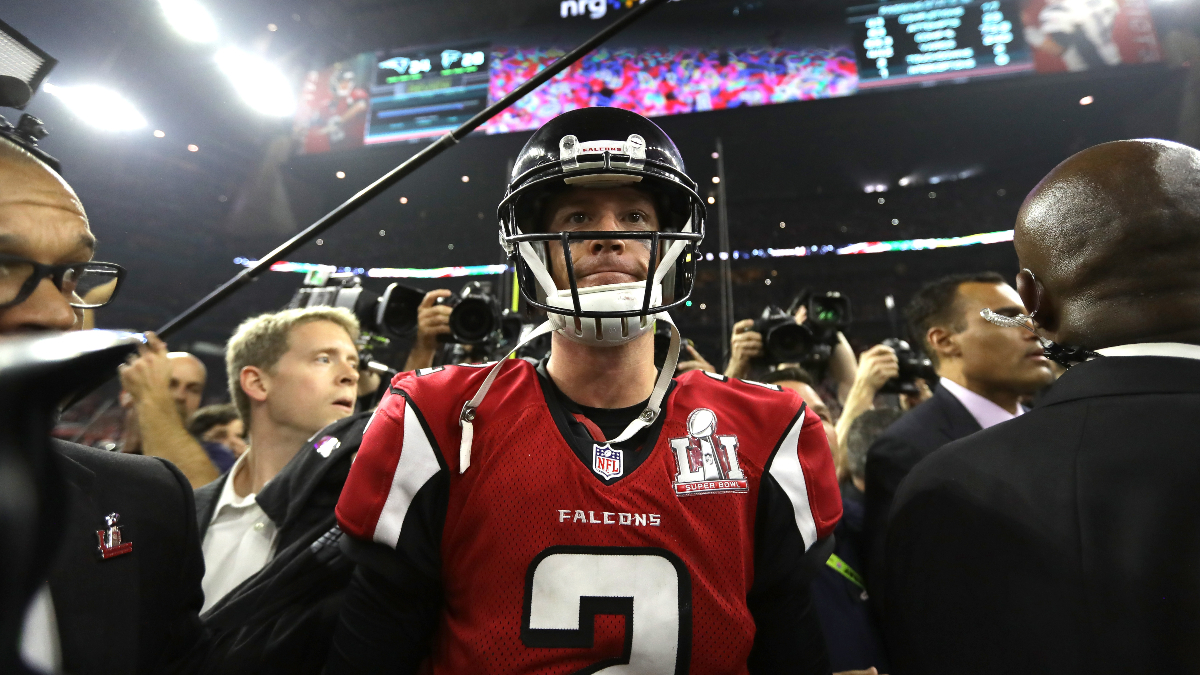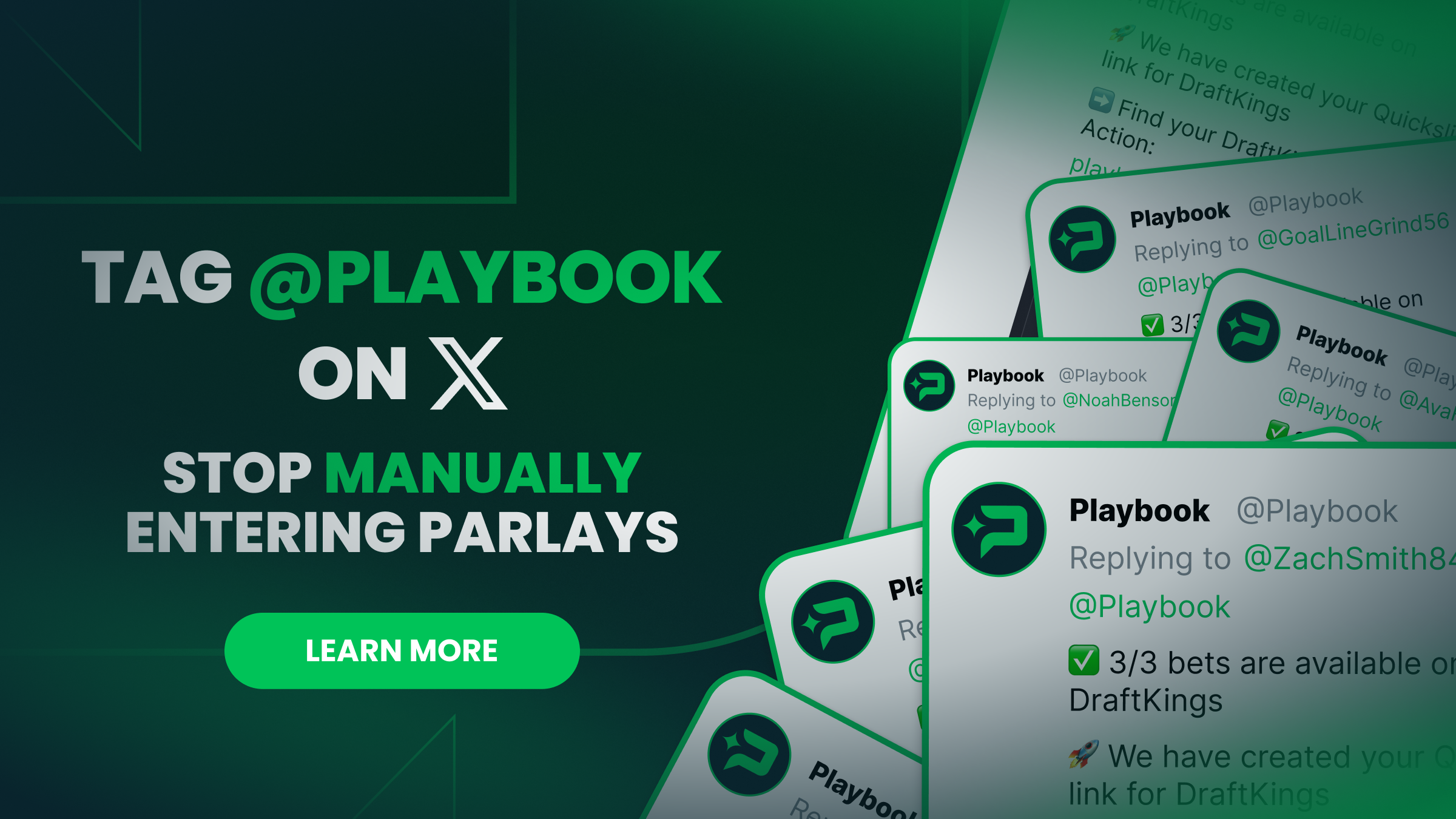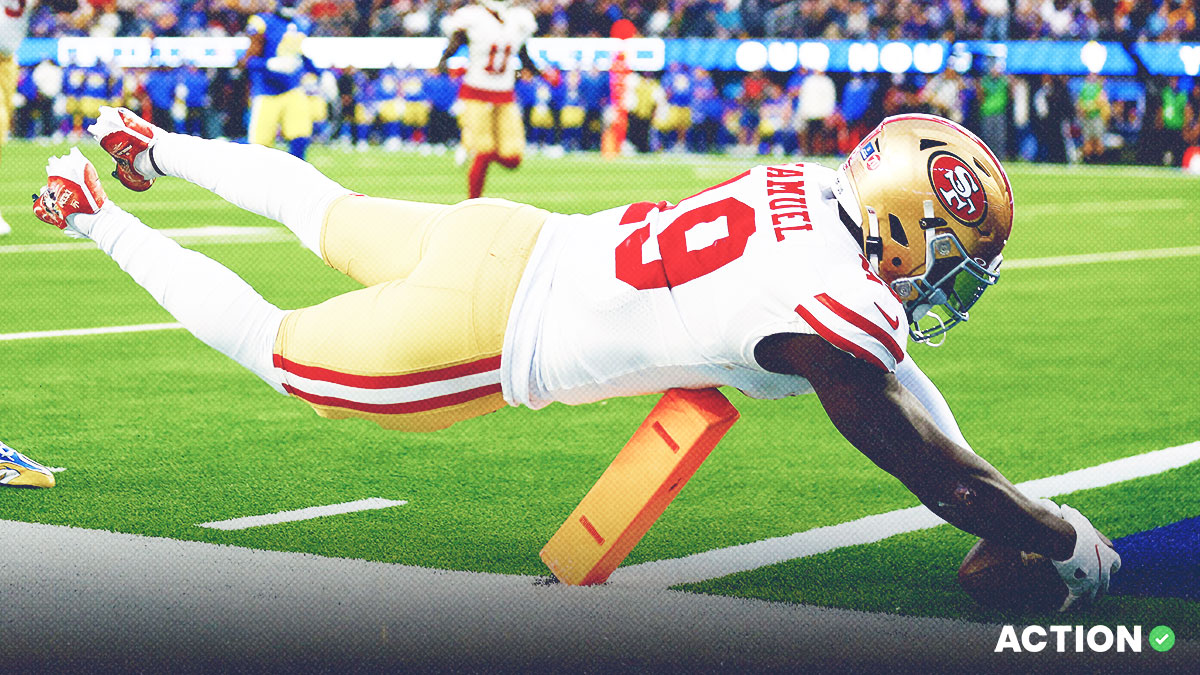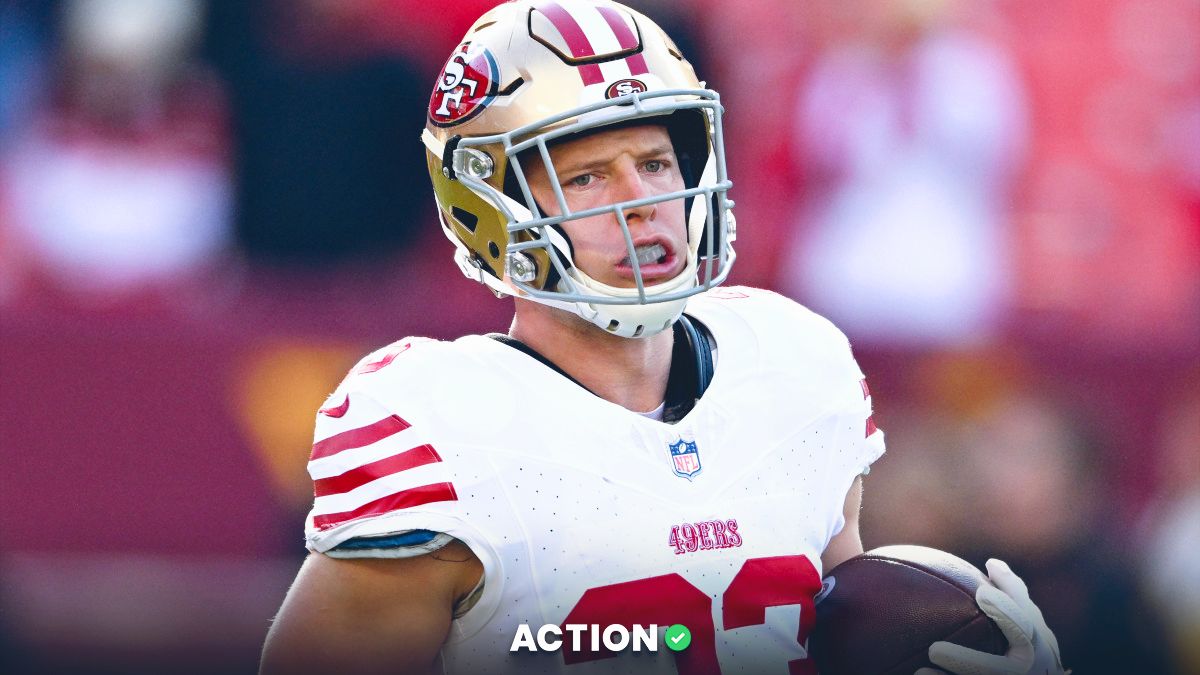To beginners, sports betting can feel at best overwhelming and at worst rigged against you. Not a great place to start a new hobby.
I mean, what is all this?
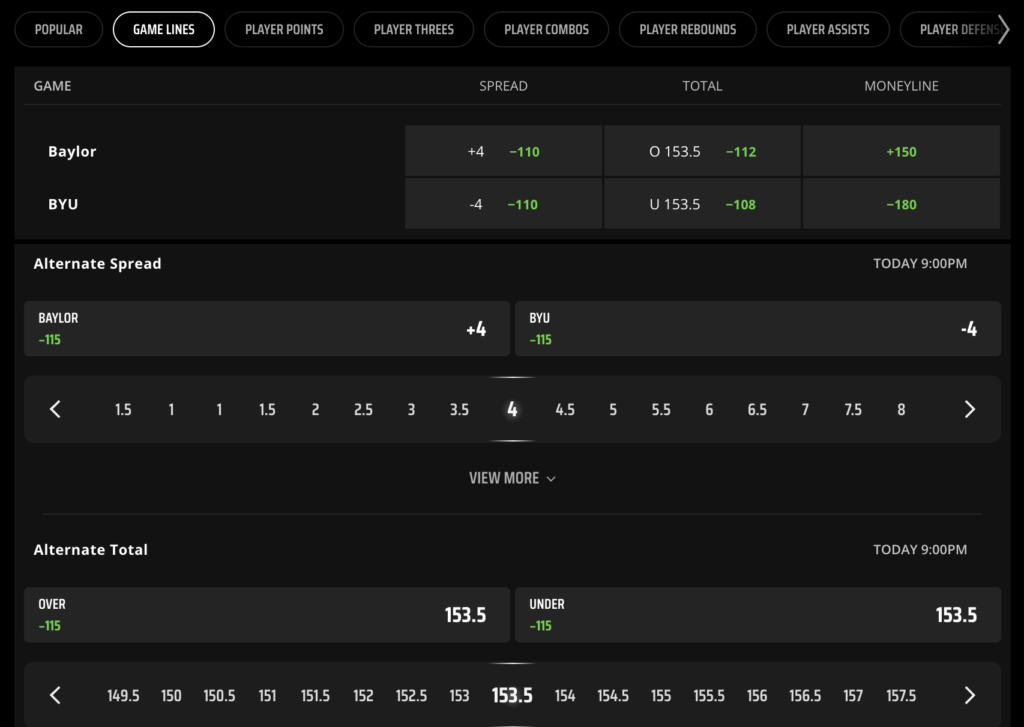
I pick on DraftKings to illustrate something scary. They have probably my favorite user experience and navigation of any sportsbook, and if this is what I'd consider the best, how confusing is it everywhere else for someone brand new to betting?
Below, I'll take you through the 12 most important things to know if you're just starting your betting journey — from deciphering all the numbers on the screen to placing your first bet and beyond.
How to Bet on Sports for Beginners: 12 Tips
Use the links below to jump to each section.
1. Favorites vs. Underdogs
When oddsmakers release a betting line on a game or any other bet, the first thing they do is decide which team should be the favorite and which should be the underdog.
The favorite is the team that is more likely to win the game and will get a minus sign next to its odds. The underdog is expected to lose and gets a plus sign.
Here's how it looks at FanDuel.
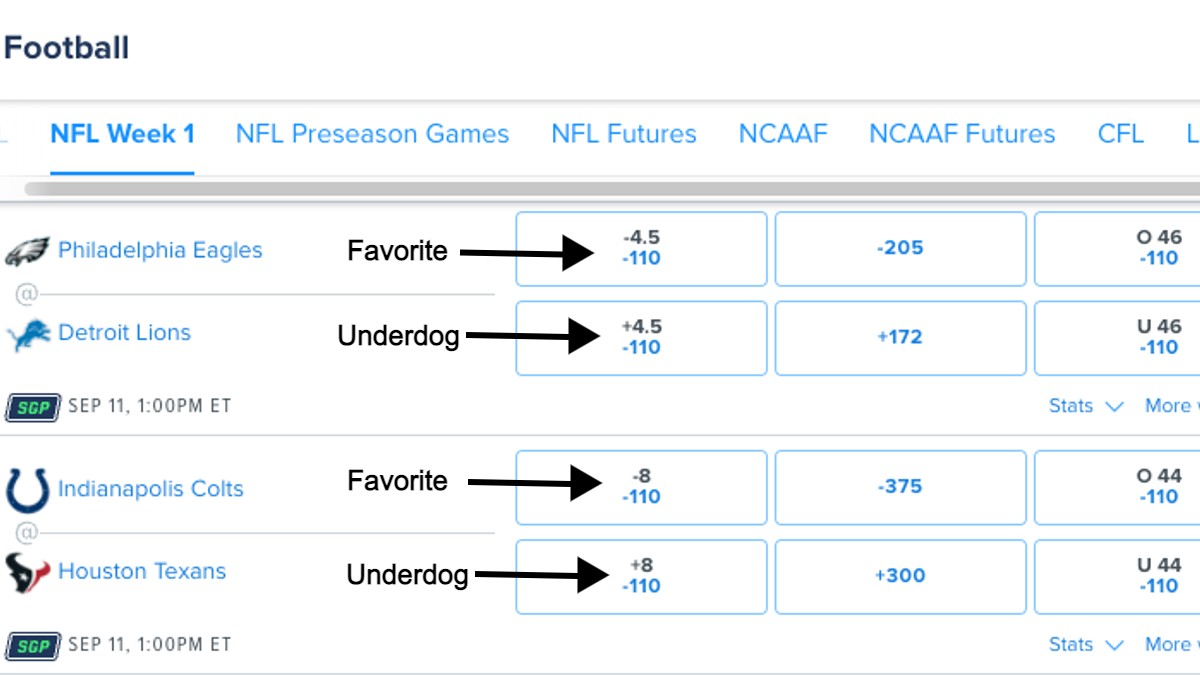
If the game is a true 50/50 toss-up, books will open it as a "pick" or "pick'em."
2. Spreads
There are two main ways to bet on a favorite or an underdog. The first is the point spread, which is a bet on the margin of victory.
Let's use the same example from FanDuel.
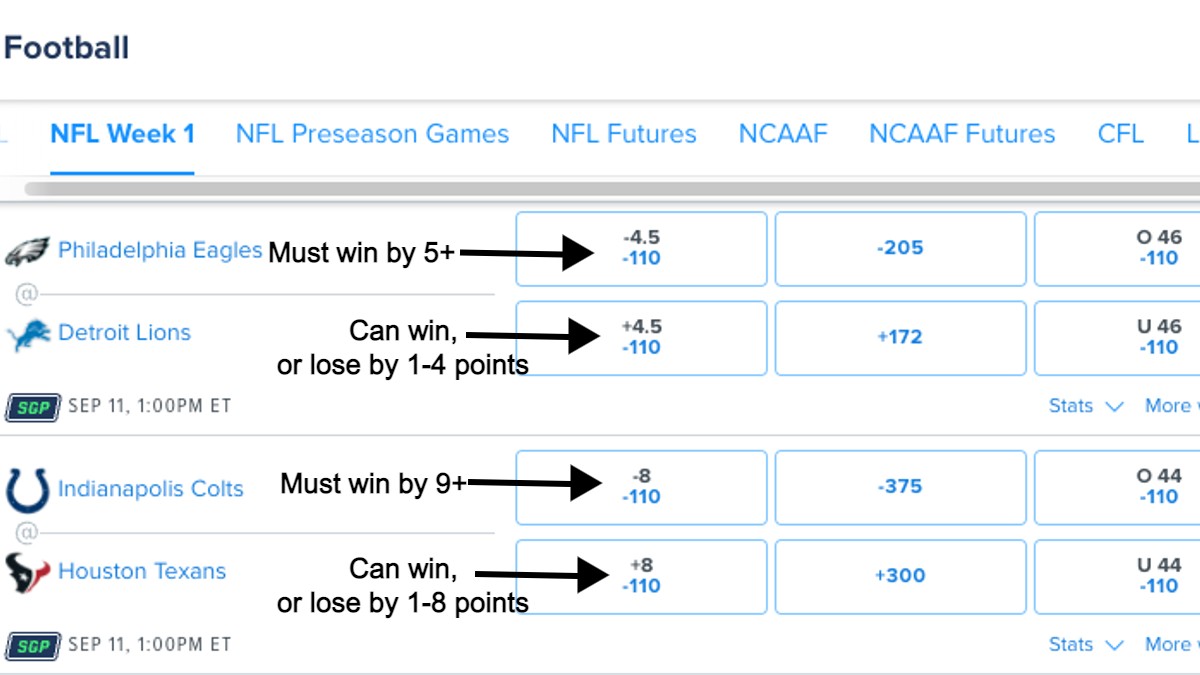
The Eagles are a -4.5 favorite over the Lions in Week 1. That means anyone betting on Philadelphia needs the Eagles to win by 5 or more points. Anyone betting on Detroit needs the Lions to lose by 1-4 points or win the game.
- Eagles win by 7: Eagles bettors win
- Eagles win by 3: Lions bettors win
- Lions win by 3: Lions bettors win
Point spreads are adjusted for team ability and many other factors. That's why the Colts are an 8-point favorite on the road against the lowly Texans, while the Eagles are a smaller favorite on the road against the Lions.
Spreads are available in every sport but most common in higher-scoring sports like basketball and football.
You can place point spread bets like the example above with FanDuel. To learn more about the sportsbook, read our FanDuel promo code review.
Still confused? Check out this video breaking down point spreads.
3. Moneylines
The second way to bet on a favorite or an underdog is on the moneyline. A moneyline bet requires you to just pick the winner of the game, and uses American odds to calculate the payout.
American odds are centered around winning $100.
So if you're betting a -200 favorite, you need to risk $200 to win $100, or any fraction of that — $20 to win $10, $2 to win $1, etc.
If you're betting a +200 underdog, you will win 2x your money for every dollar wagered — $100 to win $200, $10 to win $20, $1 to win $2, etc.
Back to Colts-Texans. Oddsmakers believe Indianapolis is the much stronger team. So to bet the Colts just to win the game, you need to risk a substantial amount.
The Colts are -375 — that means you need to risk $375 to win $100 or $37.50 to win $10.
The Texans are +300. If you bet $100, you'll win $300. Or if you bet $5, you'll win $15.
You can place moneyline bets (and more) with any of Action's best sportsbooks, including bet365 and Caesars. For more information about bet365, read a bet365 Promo Code review. If you are an NFL fan in Illinois, be on the lookout for the launch of bet365 and the bet365 Illinois Bonus Code! To read more about Caesars, check out our Caesars Sportsbook promo code recap.
If you're not in a legal sports betting state, or one with only in-person betting, you can take advantage of social sportsbook or DFS bonuses like the Fliff Promo Code, Underdog Fantasy Promo Code, Sleeper Fantasy Promo Code, and PrizePicks Promo Code to get a similar experience.
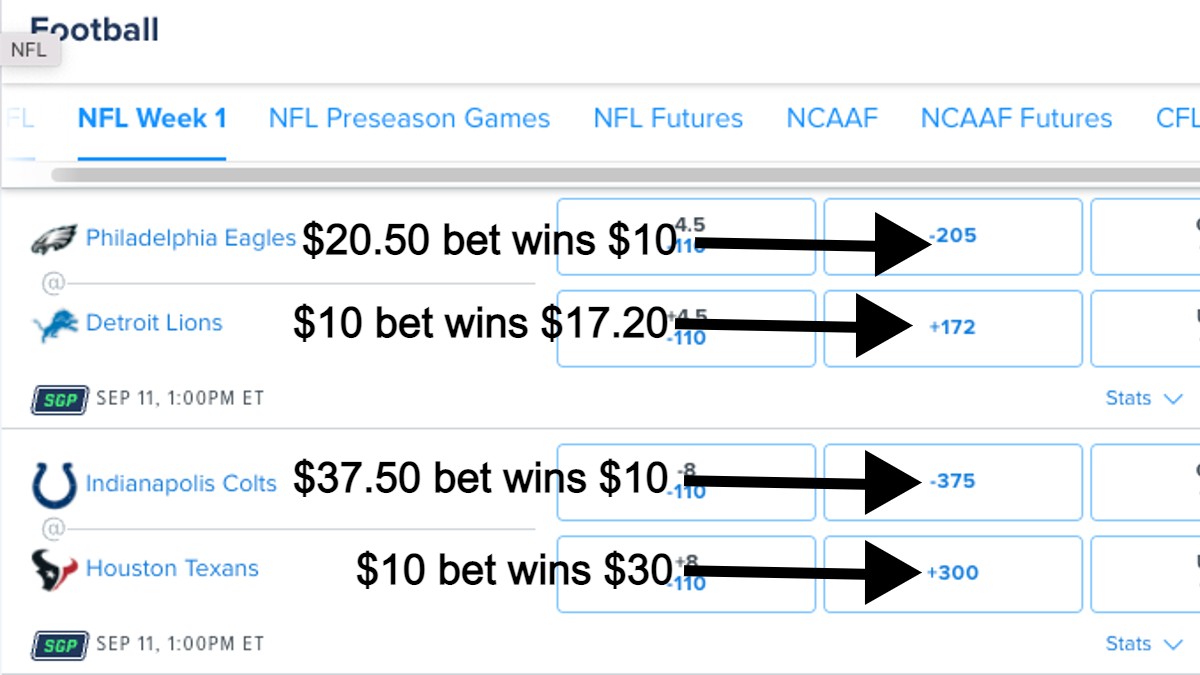
So why do you have to risk more on the favorite than you'd win on the underdog?
This is called the juice, and it's how sportsbooks maintain their edge over bettors.
Moneylines are available for all sports, but they are predominantly used when betting on lower-scoring sports like baseball, hockey and soccer.
4. Over/Unders (Totals)
In addition to setting a line for the favorite and the underdog, oddsmakers will also set a total number of points scored in a game by both teams combined. This is called the total or over/under.
Bettors can then wager on whether or not the game will go over or under the total. You're not trying to guess the exact score (though that bet is available, too).
Eagles-Lions has a total of 46 — about average for an NFL game.
- If you bet the over, you need 47+ points
- If you bet the under, you need 45 points or fewer
- If it lands on 46 exactly, it's a push and bets are refunded
Over/unders can be impacted by factors like the elements as well. Be sure to check out our NFL weather page for the latest updates on the forecast of the game(s) you're following.
When it comes to NFL betting, we have plenty of resources available to you: NFL Odds, NFL Futures, NFL Picks, and NFL ATS Standings. If you're more into NFL Props, we also have NFL Props Picks and Touchdown Props!
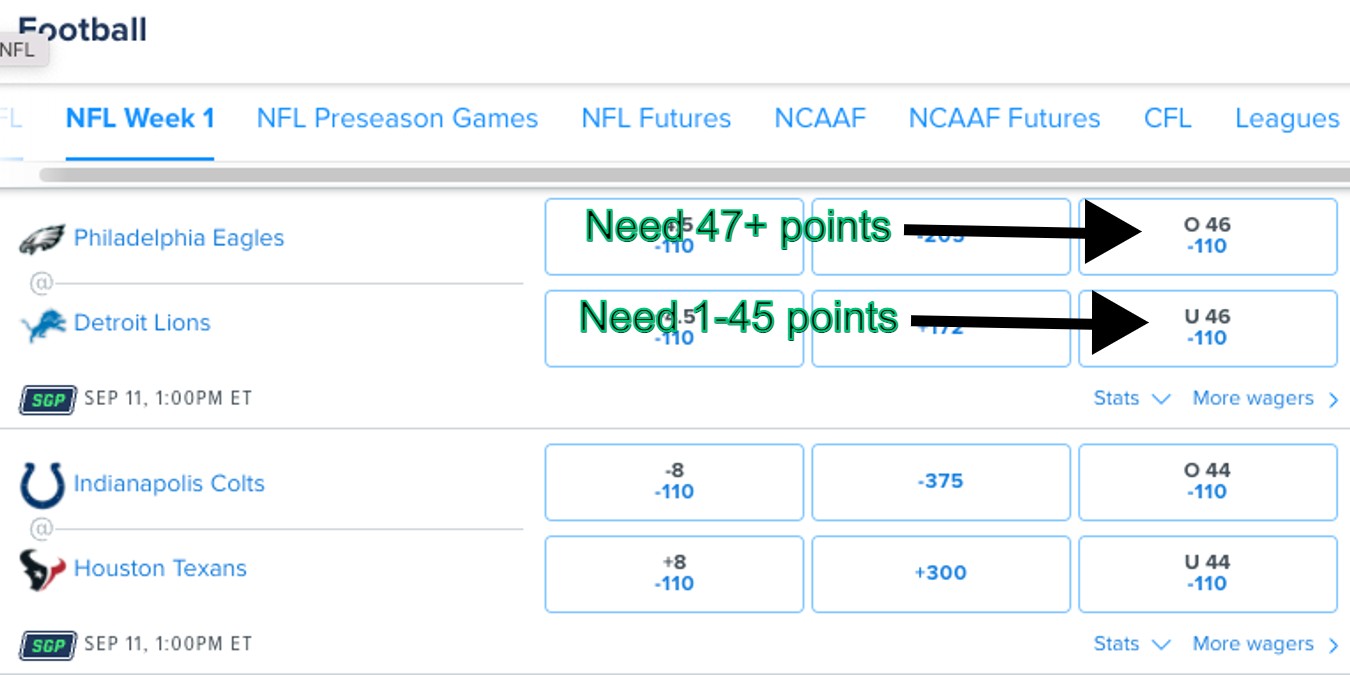
The over/under concept is applied to many different kinds of bets.
- Tom Brady over or under 295.5 passing yards
- LeBron James over 7.5 assists
- Yankees over 93.5 wins
5. What Is the -110 Number Listed Next to My Bet?
With many bets, you may see two numbers — a spread like -4.5, and then odds below it, like -110.
- The spread is the margin of victory your team needs to win by
- The -110 odds are the price you need to pay to bet that spread
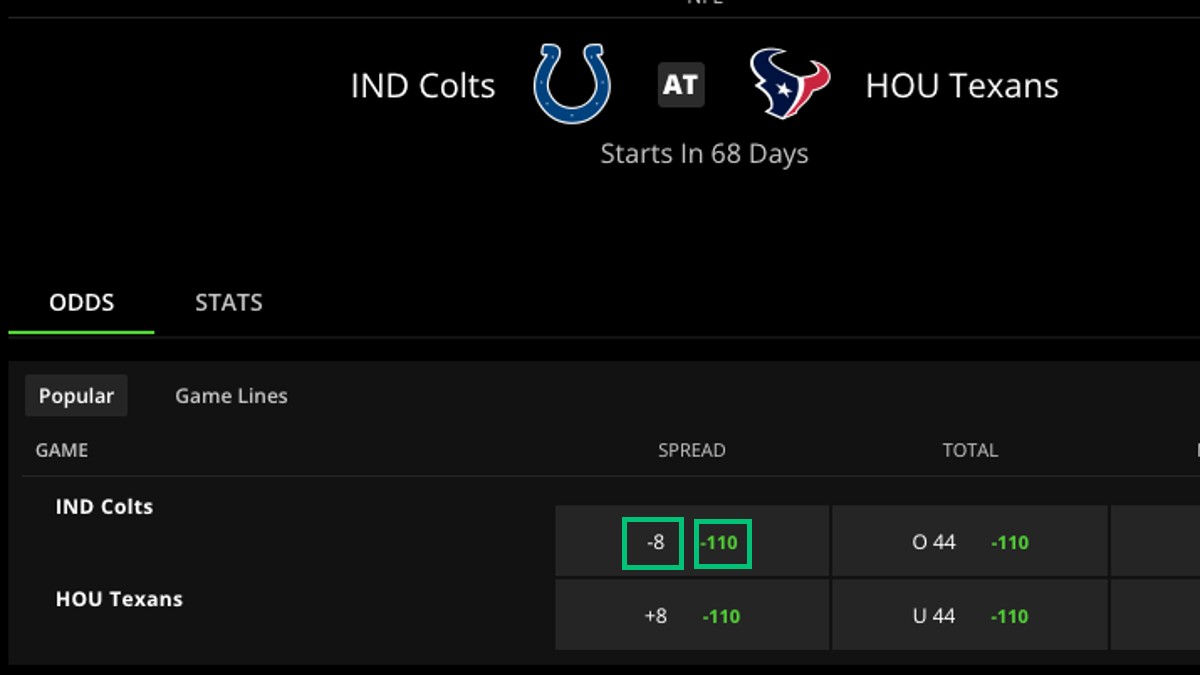
Let's say you're betting on the Colts at DraftKings.
- The spread is -8, so to win your bet, you need Indy to win by 9+ points.
- The "juice" is -110. So you'd need to wager $110 to win $100, or $11 to win $10, on that spread.
If you wager $11 to win $10 and the Colts win by 14, you'd win $10. If the Colts win by 3, you'd lose $11.
NFL spreads will usually be -110 on both sides.
But for something like an MLB spread, where the line is almost always -1.5 for the favorite and +1.5 for the underdog, the juice will differ depending on the gap in ability between the two teams.
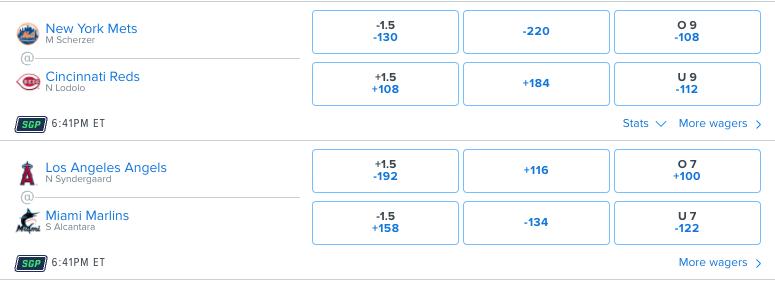
6. How to Place a Bet
OK, so you now know what each bet means. So how do you place them?
Most sportsbooks make it quite easy.
- Navigate to your desired game and bet type
- Click the "bet cell"
- The bet will populate in your bet slip
- Enter your bet amount
- Submit bet
Each team will be lined up with its corresponding lines. So in that video, USC was a 14-point underdog against Alabama. To bet USC, just click the cell across from its name.
7. Where to Place a Bet: Best Online Sportsbooks
So where can you actually place a bet?
More than half the U.S. states have some form of legal betting, but more than two dozen have full online wagering. Others have only in-person betting at casinos, racetracks and other venues. Legalized online North Carolina sports betting went live on March 11, 2024. BetMGM and FanDuel were among the first of the North Carolina sports betting apps that launched in the Tar Heel State. Learn more by checking out our BetMGM North Carolina bonus code and the FanDuel North Carolina promo code.
Stay up to date and keep track of all of the states with legal sports betting to see what the status of legal mobile sports betting is in your location. Missouri sports betting is the next launch expected to happen in 2025!
You can also place bets at betting exchange platforms. These websites let you bet against other users at lower fees in comparison to traditional sportsbooks.
Make sure to enhance your betting strategies by using welcome offers such as the Fanatics Sportsbook promo code, and the BetMGM bonus code. An exciting new sportsbook has entered the market soon as well — ESPN BET. Learn more about ESPN's sportsbook offering by reading our ESPN BET promo code and review.
8. How Much to Bet
In the end, you have the final say on how much to risk on a game, but a good rule is risk only what you can afford to lose. Sports betting is a marathon, not a sprint. There will be good days and bad days. As a result, we recommend a flat-betting approach.
This means betting the same amount on every game and risking only 1% to 5% of your bankroll per play (the bankroll is the starting amount you have at your disposal to bet with). For example, if you are starting with a bankroll of $100, you should risk no more than $5 per game.
By employing a flat-betting approach, bettors guard themselves against losing their entire bankroll during a bad stretch, but also set themselves up for a positive return on investment (ROI) when they're doing well.
Click to return to table of contents.
9. Parlays
A parlay is a wager type in which two or more bets are linked together to create one bet with a greater payout, but all the bets must win.
So instead of betting $10 each on three games, you can make one $10 wager that will pay out more of all three teams win. But if even one loses, you lose your $10.
The payouts will vary based on how many bets you include, and the prices of those bets.
This MLB parlay with Mariners +114, Mets -220 and Marlins and Marlins -134 pays +443.
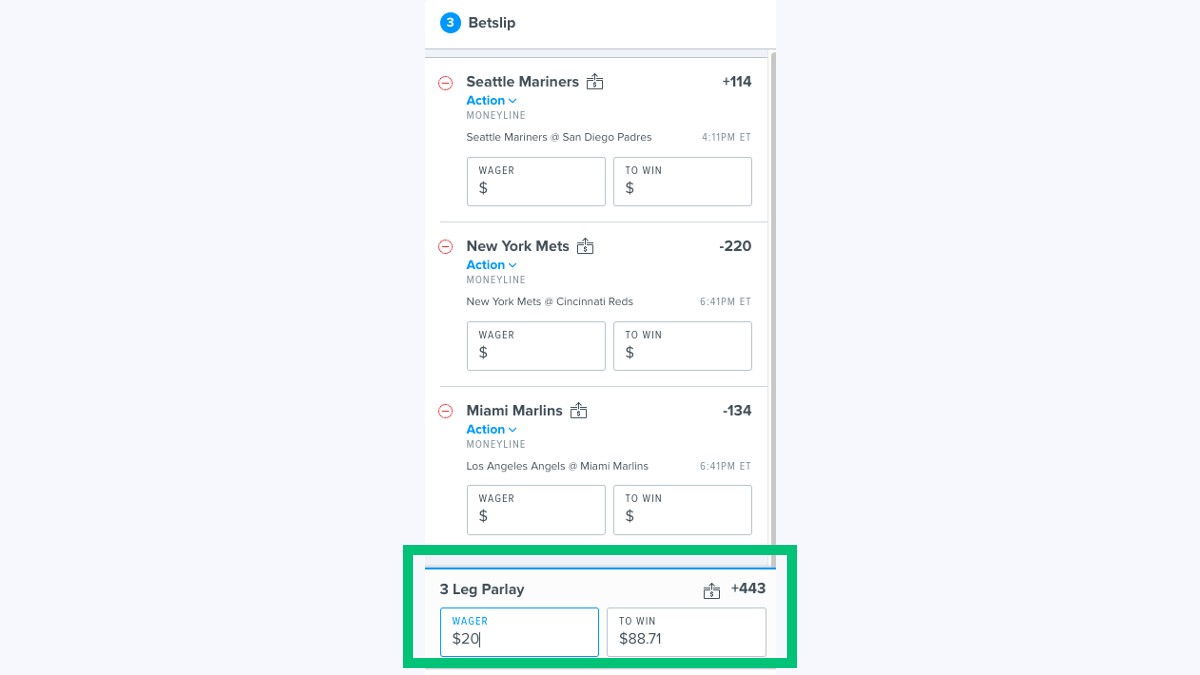
Even more popular than traditional parlays featuring multiple games is the same game parlay, pioneered by FanDuel and now offered by almost every sportsbook.
This feature allows you to parlay multiple bets from the same game, with the correlation of each event priced in. That means if you bet over 51 in Rams-Bengals and Matthew Stafford over 2.5 passing touchdowns, you won't get the full parlay payout, because those events are more likely to happen together.
Same game parlays wildly popular in standalone NFL and NBA games.
10. Props
Betting spreads and totals isn't enough for most people anymore.
Props — short for proposition bets — can be any wager that's not a standard point spread, moneyline or total.
But when people refer to props, they're usually talking about player props like:
- Steph Curry over or under 5.5 assists
- Max Scherzer over or under 7.5 strikeouts
- Derrick Henry to score the first TD +500
Like point spreads, you often have to pay the corresponding price with props.
Here, Scherzer's strikeout total against the Reds is set at 7.5. But it's more likely than not he goes under, according to FanDuel's lines, so you have to pay a steeper price to bet the under than the over.

If you're getting serious about being successful from betting on sports, props are a great place to start.
U.S. sportsbooks offer hundreds of props on every game, creating a greater attack surface since they can't properly price all of them. Even if you're not creating your own statistical models, tracking specific props and understanding how they're priced can help give you an edge over the sportsbooks.
11. Shop for the Best Line
Lines can vary based on the sportsbook, because different books have different clienteles. As a result, one book may post the Cavs -8 while another has -7.5.
Having access to more than one sportsbook allows you to shop for the best line. Getting an extra half-point might not seem like a huge deal, but it adds up over the long haul and increases your chances of winning.
Our live odds pages will automatically surface the best line for every game.
12. Identify Your Strengths and Weaknesses
This isn't Monopoly money, so you want to make sure you're tracking your progress. The easiest way to do that is with our award-winning (and free!) app, which has awesome features like live bet cover probability and odds shopping, it also lets you track all of your bets across nearly every sport.
And that’s valuable because you can identify where your strengths and weaknesses are as you start betting. Are you more successful betting on the NFL or NBA? Do you thrive when taking player props or over/unders? These are all a good thing to know, and it can allow you to maximize your winnings.
Bonus Tip: Consult the Experts
While you should always do your own research, it can also be helpful to consult the experts when making your sports bets. The Action Network has a guide on the top sports betting handicappers so you know who to trust.





